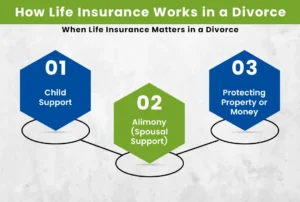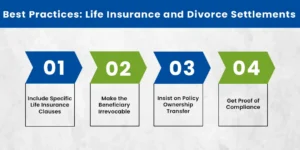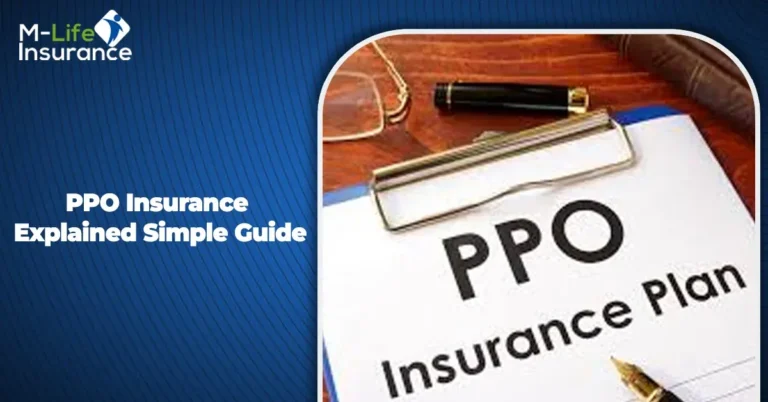Last Updated on: July 11th, 2025
- Licensed Agent
- - @M-LifeInsurance
Divorce can be complicated, especially when money, children, and support payments are involved. There are many people who forget about life insurance during a divorce. But in reality, this is very important to keep in mind and make sure that alimony and child support are paid, even if something happens to one of the parents. That’s why it’s a good idea for both people to understand how life insurance works in a divorce. In this article, we’ll explore everything you need to know about life insurance and divorce settlements, including all your questions Let’s get started
How Life Insurance Works in a Divorce
Divorce changes so many things, including how life insurance policies are viewed and handled. Most of the time, one or both people already have a life insurance policy. When the divorce starts, it’s up to the court. They decide after viewing the policies whether to keep them, stop the policies, or update them.
When Life Insurance Matters in a Divorce:
– Child Support
If one of the parents has to cover all the child’s expenses, then the court will ask them to keep a life insurance policy. The child or the other spouse would be named as a person who gets the money if something happens to them. This helps make sure the child gets support and will be protected financially.
– Alimony (Spousal Support)
If someone has to pay money to their ex after divorce, they need life insurance to make sure the payments keep going if they die.
– Protecting Property or Money
If one person keeps something valuable, like a house or business, life insurance can help make it fair by giving money to the other person.

Can Life Insurance Be Part of a Divorce Settlement?
Yes, life insurance can be a part of a divorce deal. It is used when kids or one of the spouses’ support is involved. The courts of the US know that life insurance will help both and make sure that the children or ex-spouse are still taken care of financially.
Common Ways Life Insurance is Incorporated:
- Court Orders: The court can order one person to keep a life insurance policy and name their ex or kids to get the money if something happens to the person.
- Agreements Between Spouses: Sometimes, both people agree on how to handle life insurance as part of the divorce.
- Changing Policy Ownership: One person might give the life insurance policy to the other so they can choose who gets the money and have full control.
What Happens to Life Insurance in Divorce?
There are different ways life insurance can be handled during or after a divorce. It depends on the type of policy, whether it’s term or permanent, who owns it, and what the divorce agreement says.
1. Beneficiary Designation Changes
Getting divorced does not mean that the ex-spouse automatically takes off a life insurance policy. If the person who owns the insurance policy forgets to change the name of the beneficiary, the ex can still get the money. Some states in the US have laws that remove an ex as a beneficiary after divorce. But not all the states do the same.
2. Policy Ownership Changes
Ownership matters the most. The person who owns the life insurance policy is very important. The owner can change who gets the money, cancel the policy, or take money from it if it’s a whole life policy. Sometimes, ownership is given to the other person in the divorce to make sure the policy can’t be changed later.
3. Premium Payment Responsibility
The divorce agreement can say who must pay for the life insurance. If the insurance policy is needed for alimony or child support, the person in charge has to make sure the payments are made on time.
Types of Life Insurance in Divorce Settlements
Understanding the types of policies involved is very important. The two most common are:
Term Life Insurance
Term life insurance works very well for child support because this insurance policy gives coverage for a set number of years, like 10 or 20. This policy is best because the payment usually stops when the child becomes an adult. Term life insurance policy costs less and is simple to understand.
Permanent Life Insurance
Permanent life insurance includes whole life and universal life insurance. This policy will last your entire life, and it is a little expensive. But there is a good thing about these policies, that they build cash value over time. You can borrow this amount whenever you need it. In a divorce, permanent life insurance can be treated as part of the couple’s assets and divided between them
Best Practices: Life Insurance and Divorce Settlements
If you are working on a divorce or looking at an old agreement, follow these easy steps to prevent problems later:
1. Include Specific Life Insurance Clauses
Don’t leave life insurance out of the divorce decree. Include language that outlines:
- Who must maintain coverage?
- Minimum coverage amount.
- Duration of coverage.
- Beneficiary details.
- Who owns the policy, and who pays the premiums?
2. Make the Beneficiary Irrevocable
If you rely on an ex-spouse’s policy, request to be listed as an irrevocable beneficiary. This prevents them from changing the beneficiary without your consent.
How Much Does Life Isurance Cost?
3. Insist on Policy Ownership Transfer
If feasible, ask to become the owner of the policy. This gives you control and ensures your rights aren’t revoked later.
4. Get Proof of Compliance
Ask for annual proof that premiums are being paid and the policy is active. If needed, the court can include this requirement in the settlement.

Life Insurance and Divorce Settlements: How to Choose the Right Policy
It’s very important to think about some key things when choosing the best life insurance for a divorce settlement.
The first thing you have to do is match the length of the policy to how long you need to pay alimony or child support.
Next thing you have to figure out how much money you will need to cover the future payments. It is also a smart decision to get insurance early because if you are healthy and young, the cost will be lower.
Finally, pick the plan that you can afford so you will never miss any payments and lose your coverage.
Final Thoughts
Divorce ends the marriage, but it does not end the financial responsibilities. These responsibilities get bigger if you have kids or long-term support. That’s why life insurance is very important in divorce deals. The right insurance policy will help to keep money safe for the kids and the future and give everyone peace of mind. So it’s important to understand how life insurance works after a divorce. By knowing everything, you are protected if something bad happens.
FAQs
Can life insurance be part of a divorce settlement?
Yes, life insurance is often used in divorce to make sure money for child support, alimony, or other payments is safe.
What happens to life insurance in divorce?
Policies may be updated, ownership may transfer, and new policies may be required. Beneficiaries should also be reviewed or updated.
What type of life insurance is best for divorce settlements?
Term life insurance is typically the most practical and affordable option for securing financial obligations after divorce.
Do I need to buy a new policy after divorce?
It depends. If you’re obligated to provide financial support, you may need to buy a new policy or modify an existing one.
Can my ex remove me as a beneficiary after divorce?
Yes, unless you are named as an irrevocable beneficiary or you own the policy. Legal protection in the divorce decree can prevent this.

Joyce Espinoza, Expert Life Insurance Agent
Joyce Espinoza is a trusted life insurance agent at mLifeInsurance.com. She’s been in the insurance industry for over ten years, helping people, especially those with special health conditions to find the right coverage. At MLife Insurance, Joyce writes easy-to-understand articles that help readers make smart choices about life insurance. Previously, she worked directly with clients at Mlife Insurance, advising nearly 3,000 of them on life insurance options.





